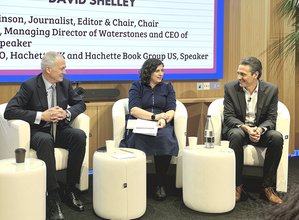In the opening panel at the London Book Fair today, James Daunt, Barnes & Noble CEO and managing director of Waterstones, and David Shelley, CEO of Hachette UK and Hachette Book Group in the U.S., spoke about similarities and differences between book operations and markets in the U.S. and U.K. The conversation was moderated by journalist and book critic Alex Peake-Tomkinson.
 |
|
| From left: James Daunt, moderator Alex Peake-Tomkinson and David Shelley | |
Saying that publishing always goes through cycles, and right now the cycle is "clearly up," Daunt called it "hugely energizing" that B&N is expanding and renovating its stores and changing how it operates, particularly giving booksellers more autonomy. He noted that while nonfiction sales are off, children's and YA sales "on both side of the Atlantic" continue to be strong, with kids "bringing energy into the shops." One cautionary note: more in the U.S. than in the U.K., booksellers need to make stores more attractive to children again, especially following "the removal of chairs and end of story times" during Covid. Also, while B&N's core business is healthy, outside considerations, particularly rising costs and inflation, are challenging.
Shelley said he is "cheerful" about the book business, in large part because of TikTok, which is driving sales of physical books, particularly among readers aged 12 to 24. He noted that Hachette has also seen "some good sales" for "quasi-academic" nonfiction. Among other trends, Shelley pointed to "self help and self development," or "helping people cope with modern life." It's a category that demonstrates how books can often be more informative and helpful than articles online, he continued. Escapist fiction is a strong category, too.
Asked about differences between the U.S. and U.K. markets, Shelley noted that some celebrities popular in one country are completely unknown in the other.
For his part, Daunt said, "Americans buy more hardbacks and at much higher prices." Asked why, he added, "Because they're richer." Daunt said, too, that Waterstones is good at "taking good books by unknown authors and making them into bestsellers," something that B&N is "slowly getting better at."
Shelley noted that one of his most satisfying accomplishments heading Hachette in both the U.S. and the U.K. is "matching people" in the two companies to talk about particular projects or approaches that can be shared. Earlier, the two companies operated quite separately.
He mentioned that he is proud that Hachette UK has opened several offices outside London, bringing new perspectives to the business. In the U.S., Hachette Book Group has 11 offices outside New York, "each of which have ways of understanding readers in those areas."
Asked about AI, Daunt said that booksellers will always be "innately" against AI-derived books, "even AI-generated covers." On the back end of things, particularly customer service, AI could be helpful. For Shelley, copyright and transparency "safeguards need to be put in place," and if so, then "AI could be good for publishers." --John Mutter

